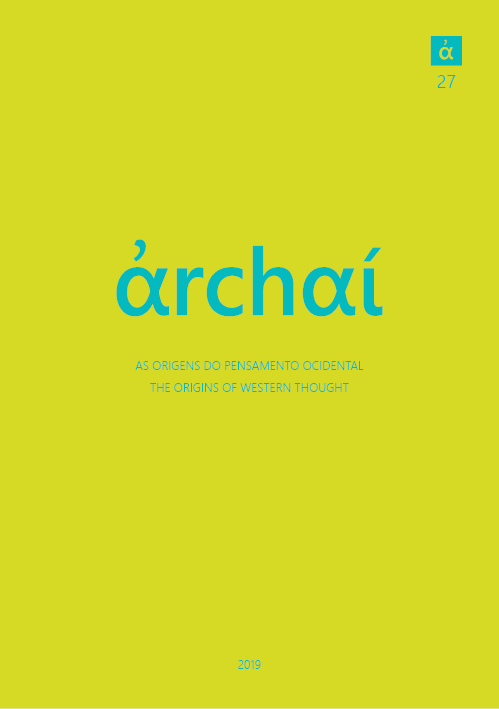The notion of language deviations in St. Augustine’s Ars pro fratrum mediocritate breuiata
Keywords:
Linguistic correction (Latinitas), barbarism, solecismAbstract
The notion of linguistic correction (Latinitas) with which Augustine of Hippo introduced his Ars pro fratrum mediocritate breuiata seems central to the philosopher's grammatical discussion, not only because of the various examples that Augustine offers about the definitions of barbarism and soloecism at the end of this treatise, but also because the subject of correction (Latinitas) and, consequently, of the deviations of language (barbarismus and soloecismus), are also presented in other non-grammatical works: The confessions, De ordine and De doctrina Christiana. In this article, we propose to evaluate the conceptual outlines of the notions of barbarism and solecism in the work of Augustine, considering, on the one hand, the definitions present in the Ars breuiata, and, on the other, the way in which Augustine also presents them in his philosophical work. We propose that the normative orientation contained in the text of ars must be relativised by ethical questions that arise from the comments present in the Confessions, the De ordine and the De doctrina Christiana.
Downloads
References
BARATIN, M. (1994). Sur la structure des grammaires antiques. In: DE CLERQ, J.; DESMET, P. (eds.). Florilegium historiographiae linguisticae : Études d’historiographie de la linguistique et de grammaire comparée à la mémoire de Maurice Leroy. Leuven-la-Neuve, Peeters, p. 143-157.
BARATIN, M.; DESBORDES, F. (1987). La ‘troisième partie’ de l’Ars grammatica. In: TAYLOR, D. J. (ed.). The History of Linguistics in the Classical Period. Amsterdam, John Benjamins, p. 41-67.
BELMONTE, A. (trad.) (2008). Agostinho. Contra Acadêmicos; A Ordem; A Grandeza da Alma; O Mestre. São Paulo, Paulus.
BERMON, E.; BONNET, G. (2013). Abrégé de la grammaire de Saint Augustin. Paris, Belles Lettres.
BORRUSO, S. (trans.) (2007). Augustine. On order [De ordine]. Indiana, Saint Augustine’s Press.
BUTLER, H. E. (trans.) (1920). Quintilian. Institutio oratoria. London, Heinemann.
CAMERON, A. (1993). The Later Roman Empire. Cambridge, Harvard University Press.
CAPLAN, H. (trans.) (1954). [Cicero]. Rhetorica ad Herennium. Cambridge, Harvard University Press.
CATAPANO, G. (ed.) (2006). Agostino. Tutti i Dialoghi. Introduzione generale, presentazioni ai dialoghi e note. Traduzioni di M. Bettetini, G. Catapano, G. Reale. Milano, Bompiani.
DESBORDES, F. (2007). Idées grecques et romaines sur le langage : travaux d’histoire et d’épistémologie. Lyon, ENS editions.
DEZOTTI, L. C. (2011). Arte Maior e Arte Menor de Donato. Tradução, anotação, estudo introdutório. Dissertação de Mestrado. São Paulo, FFLCH/USP.
FARIA, A. P. C.; SEABRA, A. (trads.) (2005). [Ps.-Cícero]. Retórica a Herênio. São Paulo, Hedra.
FORTES, F. S. (2012). Uso, variação e norma na tradição gramatical latina. Signum: Estudos da Linguagem 15, n. 2, p. 197-214.
FREITAS, F. (2016). O pensamento gramatical de Santo Agostinho. Dissertação de Mestrado. Juiz de Fora, PPG-Linguística/UFJF.
GREEN, R. P. H. (ed.) (1995). Augustine. De Doctrina Christiana. New York/Oxford, Clarendon Press.
GUERREAU-JALABERT, A. (ed.) (1982). Abbon de Fleury. Quaestions grammaticales. Texte établi, traduit et commenté. Coll. ALMA. Paris, Les Belle Lettres.
HOLTZ, L. (1981). Donat et la tradition de l’eseignement grammatical. Étude sur l’Ars Donati et sa diffusion (IVe-IXe siècle) et edition critique. Paris, CNRS.
KASTER, R. (1988). Guardians of language: the grammarians and society in Late Antiquity. Berkeley, University of California Press.
KEIL, H. (ed.) (1981). Grammatici Latini. Hildesheim, Olms. (Reprint; 1st published in 1855-1880).
LAW, V. (1984). ‘St. Augustine’s ‘De Grammatica’: Lost or Found? Recherches Augustiniennes et Patritiques 19, p. 155-183.
LAW, V. (1987). Late Latin Grammars in the Early Middle Ages: A Typological History. In: TAYLOR, D. J. (ed.). The History of Linguistics in the Classical Period. Amsterdam, John Benjamins, p. 191-206.
LAW, V. (1990). Auctoritas, consuetudo and ratio in St. Augustine’s Ars grammatica. In: EBBESEN, S.; KOERNER. E. F. K.; BURSILL-HALL, G. L. (eds.). De Ortu Grammaticae: Studies in medieval grammar and linguistic theory in memory of Jan Pinborg. Amsterdam, John Benjamins, p. 191-208.
LUHTALA, A. (2005). Grammar and Philosophy in Late Antiquity: a study of Priscian’s sources. Amsterdam, John Benjamins.
MARTÍN, B. (trad.) (1957). Obras de San Augustin: De la doctrina cristiana; Del Génesis contra los maniqueos; Del Génesis a la letra, incompleto; Del Génesis a la letra. Madrid, La Editorial Catolica.
MYNORS, R. A. B. (ed.) (1961). Cassiodorus. Institutiones. 2ed. Oxford, Clarendon Press. (1ed 1937).
OLIVEIRA, N. A. (trad.) (2002). Agostinho. A doutrina cristã. São Paulo, Paulus.
SANTOS, J. O.; PINA, A. A. (trads.) (1996). Agostinho. Confissões. São Paulo, Nova Cultural.
SEPPÄNEN, M. (2014). Defining the art of grammar: Ancient perceptions of γÏαμματική and grammatica. Doctoral dissertation. Turku, Department of Classics University of Turku.
SHANZER, D. (2005). Augustine’s Disciplines: Silent diutius Musae Varronis? In: POLLMAN, K.; VASSEY, M. (eds.). Augustine and the Disciplines: From Cassiciacum to Confessions. New York, Oxford University Press.
WATTS, W. (trans.) (1912). Augustine. Confessions. Books 1-8. Harvard, Harvard University Press.
WEBER, C. F. (ed.) (1861). Aurelii Augustini. Ars grammatica breviata. Marburg, Elwert.
Downloads
Published
How to Cite
Issue
Section
License
Given the public access policy of the journal, the use of the published texts is free, with the obligation of recognizing the original authorship and the first publication in this journal. The authors of the published contributions are entirely and exclusively responsible for their contents.
1. The authors authorize the publication of the article in this journal.
2. The authors guarantee that the contribution is original, and take full responsibility for its content in case of impugnation by third parties.
3. The authors guarantee that the contribution is not under evaluation in another journal.
4. The authors keep the copyright and convey to the journal the right of first publication, the work being licensed under a Creative Commons Attribution License-BY.
5. The authors are allowed and stimulated to publicize and distribute their work on-line after the publication in the journal.
6. The authors of the approved works authorize the journal to distribute their content, after publication, for reproduction in content indexes, virtual libraries and similars.
7. The editors reserve the right to make adjustments to the text and to adequate the article to the editorial rules of the journal.



